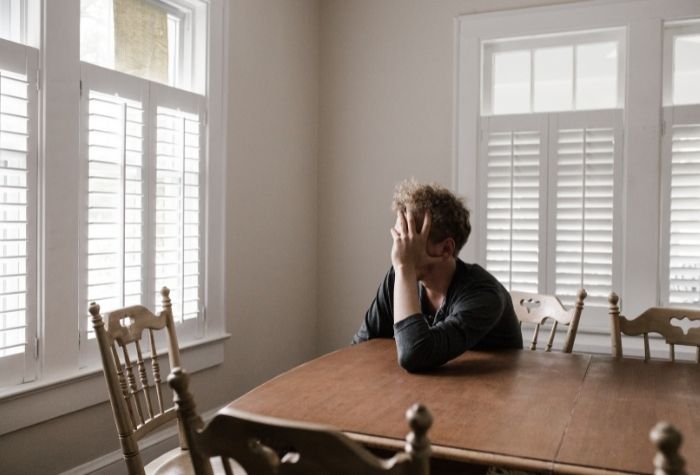Are you struggling with anxiety and finding it much more difficult to go outside after being stuck inside with COVID last year?
Are you feeling as if you are in a cycle—the harder you try to rid yourself of anxiety, the worse it seems to get?
You aren’t alone with this.
We have some practical tips to help you take the leap, to get out and break away from anxious thoughts.
First, it helps to understand how anxiety escalates when we are isolated in our homes.
The Cycle – Isolation and Anxiety
We all deal with thoughts and fears that can create anxiety. Once we develop anxiety, however, it can feel as if the more we try to push it away, the more tangled we get in the web.
It becomes a cycle. We try to suppress our thoughts, knowing that we don’t want to have anxiety, but it only leads us to have more anxious thoughts than we would have if we had never tried to suppress them, which results in added stress. This is a psychological principle known as thought suppression.
Thought suppression worsens anxiety when we are in our homes in isolation.
The longer the period of isolation, the more likely it becomes for individuals to show signs of anxiety.
Our fears and anxiety magnify because when we aren’t staying busy and active, and when we aren’t experiencing life outside of our environment.
The feeling of fear, worry, and anxiety can feel overwhelming, and it takes its toll on us both mentally and physically, leaving us feeling as if we don’t want to do anything.
We feel mentally exhausted—we don’t want to go out.
This can cause us to feel stuck in place and unable to take the first steps to change our situation.
How to Break the Cycle
Here are some practical tips that can help break the cycle between isolation, anxiety, and feeling stuck in place.
Don’t Suppress Your Thoughts
Your brain wants to remember what you are anxious about.
Your brain wants to keep you safe by remembering your fears. Do not fight it.
Allow your anxious thoughts to be what they are—do not try to suppress them.
Instead, focus on small steps that you can incorporate into your life (social connections, routine and structure, and relaxing activities) that can naturally help you keep your mind off your anxious thoughts and lighten the load.
Social Connections
- Whenever possible, spend time with family and friends in person.
- When it is impossible to connect in person, use technology to keep up.
- Making telephone calls and having video chats will help to lessen any feelings of anxiety and social isolation.
Humans are social beings. Social connections help us regulate our emotions, improve self-esteem, and are a crucial piece in reducing overall stress and anxiety. To limit feelings of isolation and the heaviness of being alone with your thoughts, keep up with your social connections.
Get Outdoors and Exercise
Anxiety can cause us to feel fatigued and not wanting to get up and move around, but a sedentary lifestyle increases the odds of stress and anxiety.
Getting outside, breathing fresh air, and taking in some vitamin D from the sun can lift our mood, lower anxiety, and boost our mental health.
The outdoors, especially when we are in nature, gets us into a different environment, which helps us to forget what makes us anxious.
Exercise helps our bodies release serotonin and endorphins that improve our mood and eases off muscle tension. Exercise also promotes improved cognitive function and memory, which helps our overall mental health.
A simple walk outdoors, as little as 5 to 10 minutes, can provide enough exercise to relieve muscle tension and reduce anxiety. Short walks are just as sufficient for mental and physical improvement as long walks when completed regularly. Short walks can improve our entire well-being.
Exercise and getting outdoors can boost our creativity, which helps us to view life more openly, solve problems more efficiently, be more productive, and boost our confidence.
Routine and Structure
When we feel overwhelmed with anxiety, it is common to avoid routine and structure, but it is typically what we need.
Repetitive routines can add calm to our day, and this helps to reduce anxiety. When we structure our days we take control of our lives, which ultimately reduces stress.
Routine can be as simple as taking showers or brushing our teeth regularly. When we create a set schedule for doing chores, tasks, or getting outdoors and exercising, it makes the time that we spend throughout our day productive, which boosts our mental health.
Do Relaxing Activities
Work relaxing activities into your daily routine, such as mindfulness (awareness of our present thoughts), muscle relaxation, journaling, or any activity that you consider relaxing.
Total body muscle relaxation can be completed in a few easy steps:
- Get into a comfortable position (lay flat on your back or sit in a comfortable chair)
- Starting with your forehead, relax your muscles and allow the tension to flow away.
- Pay attention to your breathing. Take slow and deep breaths.
- Relax for 10 to 20 seconds before moving to another area of your body that uses muscles (such as your eyebrows). Notice the release of tension and how your muscles feel when they are relaxing.
- Repeat steps 1 through 4 as you continue relaxing each area of your body, from your head down to your feet.
Journaling is both a therapeutic and relaxing technique as we allow our thoughts to flow onto paper.
Free-flow journaling involves writing our thoughts without restriction. It is simply a release from our minds.
Gratitude journaling involves writing down what we are grateful for.
This helps us to shift our minds away from what troubles us to the positive aspects of our lives.
Gratitude journaling is an especially helpful practice when we compare what we are grateful for to how our lives would look without these aspects.
This is particularly beneficial when we end our day with thoughts of gratitude.
It helps us to drift off to sleep with positive non-stressful thoughts, compared to anxious thoughts that might disturb our sleep.
Reach Out for Help
Sometimes, we all need a little help to get beyond feeling anxious and overwhelmed.
Sometimes, we need help to break the cycle.
You don’t have to struggle alone.
We are here with the support that you need – exactly when you need it.
Serving the cities of Franklin and Suffolk and the counties of Isle of Wight and Southampton, we provide support, encouragement, and – above all – superior care – in our community, including Outpatient Therapy and Counseling for privately insured individuals.
Let’s move forward, together.
Call us at (757) 758-5106 or reach out to us online here.






